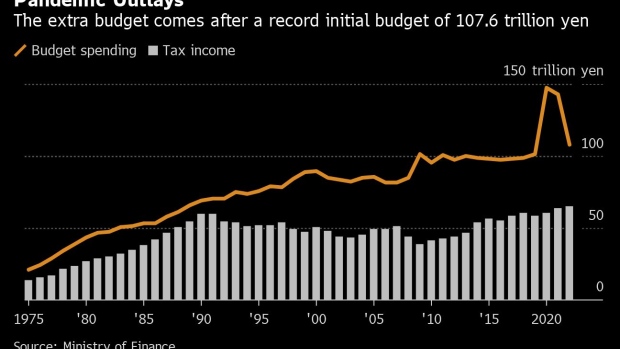Jun 5, 2022
Japan’s Kishida Set to Stay on Kuroda Path, Party Official Says
, Bloomberg News

(Bloomberg) -- Prime Minister Fumio Kishida is likely to want the Bank of Japan to stick with its current policy direction even after a change of governor, according to a senior ruling party member.
Shouji Nishida, head of a pro-spending group in the party with ties to former premier Shinzo Abe, pointed to the fiscal policy plan published last week as proof that Kishida is more committed than previously thought to the BOJ’s inflation target.
The policy draft released by the finance ministry reiterated the goal of achieving 2% inflation, as pursued by the central bank under Governor Haruhiko Kuroda. But this time it added the words “sustainably and stably” in reference to how the goal established in 2013 by Abe’s government should be met.
“What that means is the policy cooperation with the BOJ established under Abenomics must be continued,” Nishida said in an interview last week. “It means the next BOJ governor must stay on Kuroda’s path.”
Nishida’s comments come amid strong interest over who will succeed Kuroda when he steps down next spring. Economists and investors want to know whether Kishida will look to reposition the BOJ away from the ultra-low interest rate stance that has helped push the yen down to two-decade lows as other central banks hike rates to curb inflation.
The change of wording also suggests Nishida’s group could be gaining traction as a voice within the Liberal Democratic Party.
Kishida’s New Capitalism plans and his talk of increasing the defense budget suggest the government may be embarking on more spending. To fund different projects, Japan will need more debt issuance, and will benefit from rates staying low.
“The economy hasn’t completely recovered yet,” said Nishida, who is also known as an advocate of modern monetary theory. “If monetary policy changes here and rates rise, or easing is pared back, the economy will certainly collapse.”
Looser wording in the fiscal draft over the balancing of the government’s budget also hints at the possibility of more spending even after an extra budget was passed last week. While the government said it’ll continue with its existing goal of seeking fiscal health, it removed a direct reference to balancing the nation’s books by the end of fiscal 2025.
Read More: Japan Tweaks Budget Goal Wording to Gain More Fiscal Flexibility
Dropping the calendar-based goal is a clear sign of change, Nishida said. “Politics in Japan is now veering toward more aggressive fiscal policy.”
©2022 Bloomberg L.P.






